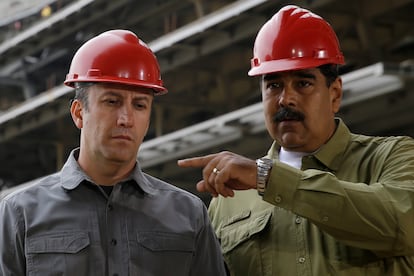Rampant corruption in Venezuela’s national oil company weighs down the economy
In the 1990s, PDVSA was a model state enterprise, but its politicization has become an albatross around the country’s neck


During former president Hugo Chávez’s rise to power, soaring oil prices produced a flood of revenue that unleashed the most tremendous corruption the country has ever experienced. With Venezuelan oil production at a new low, political mismanagement continues squandering the oil-rich nation’s sinking revenue. PDVSA, the state-owned oil company, is undergoing a new purge with the arrests of high-ranking officials and the recent resignation of Tareck El Aissami, who had served as Minister of Petroleum since April 2020. The purge stems from an investigation into the deep-seated corruption plaguing PDVSA. “Chavismo,” the populist political movement established by Hugo Chávez, has long struggled to control Venezuela’s golden goose that the enormous Chavista elite used as a petty cash fund.
PDVSA began operations in January 1976 after Venezuela nationalized its oil industry. Over the next 25 years, it was one of the few stars among the traditionally corrupt and dysfunctional Latin American state-owned enterprises. A year before Chávez was elected president in 1999, PDVSA produced 3.2 million barrels of oil per day. The company consolidated all foreign oil companies under its umbrella and inherited all their operating processes, controls, standards and practices, enabling it to function like a private oil multinational.
PDVSA’s culture of meritocracy developed a skilled workforce that butted heads with Chavismo in 2003 when oil workers joined a general strike protesting the Venezuelan government’s change in direction. It was one of the first political crises of Chávez’s Bolivarian revolution. The populist president appeared on television blowing a whistle and declaring PDVSA “offside,” like a referee in a soccer match. He then fired a large group of PDVSA managers and over 18,000 workers for participating in the strike and had their names published in pro-government news outlets. The state-owned enterprise that operated efficiently like a private company with well-compensated and highly qualified personnel clashed with Chávez’s Bolivarian socialism that viewed PDVSA as a privileged elite.
The 2003 purge led to a prolonged decline in the professionalism and competence of a once sophisticated operation. PDVSA was led for over 10 years by Rafael Ramírez, one of Chávez’s favored acolytes. During his tenure, PDVSA resources evaporated in various corruption schemes. Ramírez declared the company “red, from top to bottom,” referencing the color of Chavismo and turned it into a political tool to enlist international support through oil diplomacy: in other words, oil sales to ideological allies at deeply discounted prices. The United States remained PDVSA’s main client, buying 500,000 daily barrels of oil until 2019 when US sanctions imposed by the Trump administration took effect. Ramírez was forced out by Nicolás Maduro after Chávez died and became an opponent.
Maduro dug a deeper hole for PDVSA. After Ramírez left, another round of managerial firings enabled new power groups to get their hands on Venezuela’s cash cow. Maduro appointed a general to take over at PDVSA, who declared an emergency in the oil industry a few years later. Maduro then called in the recently departed El Aissami to right the ship amid crippling US sanctions.
The sanctions forced Venezuela to enlist the help of a complex and murky network of intermediaries to sell its oil. India, China and Russia became Venezuela’s main buyers, paying discounted prices that further ate into revenue. Venezuela cannot collect on all the oil it sells because money and product vanish among all the corrupt intermediaries. Russia’s withdrawal from the game due to the sanctions imposed after it invaded Ukraine further obscured this web of intermediaries. El Aissami set up a cryptocurrency-based system to improve revenue collection, which resulted in another $3 billion loss and triggered a new scandal.
On top of it all, the Venezuelan government’s confused fiscal policy has affected the entire economy. Some economists estimate that from 2020-2022, PDVSA lost 34% of its income due to all these adverse circumstances. A 2022 report by Transparencia Venezuela revealed that during the last 20 years of Chavismo, 16 countries have conducted 127 PDVSA-related corruption investigations related to losses of over $42 billion from Venezuelan coffers.
Sign up for our weekly newsletter to get more English-language news coverage from EL PAÍS USA Edition
Tu suscripción se está usando en otro dispositivo
¿Quieres añadir otro usuario a tu suscripción?
Si continúas leyendo en este dispositivo, no se podrá leer en el otro.
FlechaTu suscripción se está usando en otro dispositivo y solo puedes acceder a EL PAÍS desde un dispositivo a la vez.
Si quieres compartir tu cuenta, cambia tu suscripción a la modalidad Premium, así podrás añadir otro usuario. Cada uno accederá con su propia cuenta de email, lo que os permitirá personalizar vuestra experiencia en EL PAÍS.
¿Tienes una suscripción de empresa? Accede aquí para contratar más cuentas.
En el caso de no saber quién está usando tu cuenta, te recomendamos cambiar tu contraseña aquí.
Si decides continuar compartiendo tu cuenta, este mensaje se mostrará en tu dispositivo y en el de la otra persona que está usando tu cuenta de forma indefinida, afectando a tu experiencia de lectura. Puedes consultar aquí los términos y condiciones de la suscripción digital.








































